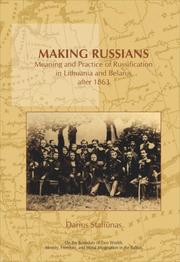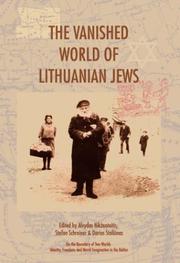| Listing 1 - 10 of 13 | << page >> |
Sort by
|

ISBN: 1282265849 9042031328 143561240X 9781435612402 9042022671 9789042022676 9789042031326 Year: 2007 Publisher: Amsterdam New York Rodopi
Abstract | Keywords | Export | Availability | Bookmark
 Loading...
Loading...Choose an application
- Reference Manager
- EndNote
- RefWorks (Direct export to RefWorks)
Making Russians is an innovative study dealing with Russian nationalities policy in Lithuania and Belarus in the aftermath of the 1863 Uprising. The book devotes most attention to imperial confessional and language policy, for in Russian discourse at that time it was religion and language that were considered to be the most important criteria determining nationality. The account of Russian nationalities policy presented here differs considerably from the assessments usually offered by historians from east-central Europe primarily because the author provides a more subtle description of the aims of imperial nationalities policy, rejecting the claim that the Russian authorities consistently sought to assimilate members of other national groups. At the same time the interpretation this study offers opens a discussion with western and Russian historians, especially those, who lay heavy emphasis on discourse analysis. This study asserts that the rhetoric of officials and certain public campaigners was influenced by a concept of political correctness, which condemned all forms of ethnic denationalisation. A closer look at the implementation of discriminatory policy allows us to discern within Russian imperial policy more attempts to assimilate or otherwise repress the cultures of non-dominant national groups than it is possible to appreciate simply by analysing discourse alone.
Russification --- Russianization --- Assimilation (Sociology)
Book
ISBN: 1618115332 1618115324 Year: 2016 Publisher: Boston, MA : Academic Studies Press,
Abstract | Keywords | Export | Availability | Bookmark
 Loading...
Loading...Choose an application
- Reference Manager
- EndNote
- RefWorks (Direct export to RefWorks)
This book deals with the spatial concepts of Lithuania and other geo-images that either "competed" in the nineteenth century with the term Lithuania or were of a different taxonomic level (Samogitia, Prussia's Lithuania, Lithuania Minor, Poland, the Western Region, the Northwest Region, Lita/Lite, Belarus, East Prussia etc.). The Russian, Lithuanian, Polish, Belarusian, Jewish, and German geo-images of this territory are analyzed in separate chapters of this volume. The spatial and topographical turns, especially the innovative perspective suggested by French Marxist Henri Lefebvre to look at the (social) space as a product of social creativity, research on so-called mental maps, postcolonial studies, and nationalism studies provided some theoretical background as well as analytical approaches for the studies published in this volume.
Geographical perception --- Spatial behavior --- History --- Political aspects --- Social aspects --- Lithuania --- Historical geography. --- Name
Book
ISBN: 9781618115331 Year: 2016 Publisher: Boston, MA
Abstract | Keywords | Export | Availability | Bookmark
 Loading...
Loading...Choose an application
- Reference Manager
- EndNote
- RefWorks (Direct export to RefWorks)
Book
ISBN: 9789633860946 9633860946 9633860725 9789633860724 9633860970 Year: 2022 Publisher: Budapest New York
Abstract | Keywords | Export | Availability | Bookmark
 Loading...
Loading...Choose an application
- Reference Manager
- EndNote
- RefWorks (Direct export to RefWorks)
This book explores anti-Jewish violence in Russian-ruled Lithuania. It begins by illustrating how widespread anti-Jewish feelings were among the Christian population in 19 th century, focusing on blood libel accusations as well as describing the role of modern antisemitism. Secondly, it tries to identify the structural preconditions as well as specific triggers that turned anti-Jewish feelings into collective violence and analyzes the nature of this violence. Lastly, pogroms in Lithuania are compared to anti-Jewish violence in other regions of the Russian Empire and East Galicia. This research is inspired by the cultural turn in social sciences, an approach that assumes that violence is filled with meaning, which is “culturally constructed, discursively mediated, symbolically saturated, and ritually regulated.” The author argues that pogroms in Lithuania instead followed a communal pattern of ethnic violence and was very different from deadly pogroms in other parts of the Russian Empire.
Multi
ISBN: 9781618115331 9781618115324 Year: 2016 Publisher: Boston, Mass. Academic Studies Press
Abstract | Keywords | Export | Availability | Bookmark
 Loading...
Loading...Choose an application
- Reference Manager
- EndNote
- RefWorks (Direct export to RefWorks)
Digital
ISBN: 9789633860946 Year: 2022 Publisher: Budapest ;; New York Central European University Press
Abstract | Keywords | Export | Availability | Bookmark
 Loading...
Loading...Choose an application
- Reference Manager
- EndNote
- RefWorks (Direct export to RefWorks)
Book
ISBN: 9781461903185 1461903181 9786155053184 6155053189 1283256681 9781283256681 9786155053177 6155053170 9786613256683 Year: 2011 Publisher: Budapest New York Central European University Press
Abstract | Keywords | Export | Availability | Bookmark
 Loading...
Loading...Choose an application
- Reference Manager
- EndNote
- RefWorks (Direct export to RefWorks)
Discusses the political cooperation between Jews and Lithuanians in the Tsarist Empire from the last decades of the 19th century until the early 1920s. These years saw the transformation of both Jewish and Lithuanian political life. Within the Jewish community, the previously dominant integrationists were now challenged both by those who believed that the Jews were not a religious but an ethnic or proto-nationalist group and those who believed that only with the abolition of capitalism and the establishment of a socialist state would Jewish integration be possible. Among the Lithuanians, the emergence of a modern national identity became increasingly prevalent.
Jews --- Hebrews --- Israelites --- Jewish people --- Jewry --- Judaic people --- Judaists --- Ethnology --- Religious adherents --- Semites --- Judaism --- Politics and government --- History --- Lithuania --- Ethnic relations. --- Antisemitism, Jewish studies, Jews, Lithuania, Russian Empire, Sources, Zionism.

ISBN: 9042008504 Year: 2004 Publisher: Amsterdam Rodopi
Abstract | Keywords | Export | Availability | Bookmark
 Loading...
Loading...Choose an application
- Reference Manager
- EndNote
- RefWorks (Direct export to RefWorks)

ISBN: 1417562005 9781417562008 9401200904 9042008504 Year: 2004 Publisher: [Place of publication not identified] Rodopi
Abstract | Keywords | Export | Availability | Bookmark
 Loading...
Loading...Choose an application
- Reference Manager
- EndNote
- RefWorks (Direct export to RefWorks)
Jews --- Middle East --- Regions & Countries - Asia & the Middle East --- History & Archaeology --- Hebrews --- Israelites --- Jewish people --- Jewry --- Judaic people --- Judaists --- Ethnology --- Religious adherents --- Semites --- Judaism --- History --- Social conditions --- Civilization --- Litauen. --- Juden. --- Jewish religion --- History of Eastern Europe --- Lithuania
Digital
ISBN: 9789633863640 Year: 2021 Publisher: Budapest New York CEU Press
Abstract | Keywords | Export | Availability | Bookmark
 Loading...
Loading...Choose an application
- Reference Manager
- EndNote
- RefWorks (Direct export to RefWorks)
This collection of essays addresses the challenge of modern nationalism to the tsarist Russian Empire. First appearing on the empire’s western periphery, this challenge was most prevalent in twelve provinces extending from Ukrainian lands in the south to the Baltic provinces in the north, and to the Kingdom of Poland. At issue is whether the late Russian Empire entered World War I as a multiethnic state with many of its age-old mechanisms run by a multiethnic elite, or as a Russian state predominantly managed by ethnic Russians. The tsarist vision of prioritizing loyalty among all subjects over privileging ethnic Russians and discriminating against non-Russians faced a fundamental problem: as soon as the opportunity presented itself, non-Russians would increase their demands and become increasingly separatist. The authors found that although the imperial government did not really identify with popular Russian nationalism, it sometimes ended up implementing policies promoted by Russian nationalist proponents. Matters addressed include native language education, interconfessional rivalry, the “Jewish question,” the origins of mass tourism in the western provinces, and the emergence of Russian nationalist attitudes in the aftermath of the first Russian revolution.
| Listing 1 - 10 of 13 | << page >> |
Sort by
|

 Search
Search Feedback
Feedback About UniCat
About UniCat  Help
Help News
News